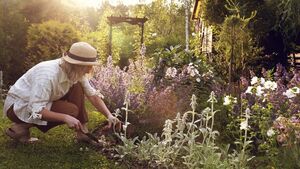Green Fingers: Exploding a few myths in a world of fake news

The trick with plants is to grow them in conditions as close to their natural habitat as possible. Stock image
I have been brought up within a large family circle of people who have or are involved in a specialist industry loosely called horticulture.
As you can imagine, there was a constant flow of knowledge passing through us all about interacting with the natural world and in particular gardening, and this was when we had no particular keen interest in the subject.
Coming from this background and accumulating knowledge sublimely and unknown to us, has thought us to acknowledge that the more we know the less we know about plants and their place in our lives.
The impression I got from our elders was that we look to nature, learn from it and from that position we make our decisions on how to cultivate plants.
The trick with plants is to grow them in conditions as close to their natural habitat as possible and with our accumulated skills we can enhance these to produce larger and better plants.
Humans, being inquisitive do at times try and stretch the boundaries and while it does work often and we benefit from this advance, it can go horribly wrong as nature pulls us back into line.
I do like the diverse nature of those involved in horticulture and that includes gardening, and that gives added interest to us all, such as when we see some people who specialise in one aspect of growing or a particular type of plant.
Of course, nothing stays still and interests change too and that is the fun thing about gardening and keeps the momentum going all your life - if you wish.
We in Orchardstown are lucky to live on land which has acid soil and can therefore grow the widest range possible of temperate hardy plants that love our mild and misty conditions with our coldest days just hovering below freezing.
There are those who swear by a number of tricks or remedies to keep this or that pest away and yet when put to the test, they fall short of being the solution.
Because slugs and snails cause so much damage there are consequently a large number of preventative methods out there including beer traps, coffee grinds and organic barriers, which give very mixed results, whereas loose pine needles (gathered in Portlaw woods) or some oats around the plants have protected many of our plants from being eaten.
Spreading a certain amount of coffee grounds, tea leaves, sand, fresh bark, lawn clippings, fire ash and chicken manure around the garden may be no harm but, it might be better if all these ingredients including vegetable peelings could be put into a compost heap.
Some people add sand to heavy soil to make it lighter but, that is of limited use and it is far better to mix in compost, leaves or other similar materials and then let nature in the form of worms do the rest.
We always water either in the morning or evening to avoid plants getting scorched but, if a plant is wilting or has dried out we will water it at any time and sometimes cover it up with a sheet of fleece until it perks up again.






